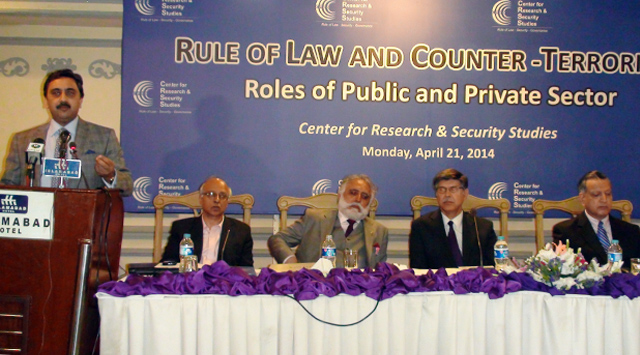 The speakers at a seminar on ‘Rule of Law and Counter-Terrorism ´ Roles of Public and Private Sectors’ on Monday called for comprehensive legal reforms to ensure rule of law in the country and deal with radicalization, extremism and terrorism.
The speakers at a seminar on ‘Rule of Law and Counter-Terrorism ´ Roles of Public and Private Sectors’ on Monday called for comprehensive legal reforms to ensure rule of law in the country and deal with radicalization, extremism and terrorism.
The seminar was organized by the Center for Research and Security Studies (CRSS). Chairman of Stockwell Green Community Services (SGCS) Mr. Toaha Qureshi MBE, Expert on International Law, Mr. Ahmer Bial Soofi, Ex-MNA Hafiz Hussain Ahmed, former DG Intelligence Bureau and expert on Criminal Justice and Police Reforms Dr. Shoaib Suddle and CRSS Executive Director Mr. Imtiaz Gul addressed the seminar.
Giving the UK perspective on counter-radicalization and rule of law, Mr. Toaha said it was not possible to establish the rule of law without police, judiciary and the community working together in support of each other. He said the efforts in the United Kingdom to deal with radicalization had started much before the 9/11 with police and community working as partners to counter radicalization, extremism and terrorism.
‘Identification of issues is the first step to handle radicalization,’ he said, adding that once the issues were identified a comprehensive policy with input from all stakeholders could be formulated. He said a variety of measures including education and employment opportunities with justice to all were the basics to establish rule of law and it was a collective responsibility of the people and the government.
Talking about the situation in Pakistan, he said rule of law could not be established until law applied to all equally without any prejudice and cast distinction. ‘Encourage public-private cooperation, engage educational institutions and create a demand for rule of law,’ he said, adding that the role of community was central in creating a demand for rule of law.
Mr. Ahmed Bilal Soofi said respect for rule of law implied respect for national and international laws equally. He said it was duty of the state to inform the people about the national and international laws. ‘Crime challenges the writ of the state and it is for the state to establish its writ through engagement, dialogue, prosecution and action,’ he said.
He said terrorism was a serious crime and before taking any stern action to curb terrorism it was a must to identify the source of radicalization that promoted and bred extremism and terrorism. He said political will also played a critical role not only in making laws but also in their application.
Hafiz Husaain Ahmed said supremacy of law was the only way to stop terrorism. ‘If law is not implemented without any discrimination, lawlessness cannot be stopped and justice cannot be ensured,’ he said, adding that the situation in the province of Balochistan was not religiously motivated. ‘The turmoil in Balochistan is because on non-implementation of the Constitution,’ he observed, referring to the injustices done to the people of the province despite constitutional guarantees. ‘No law and no Constitution exist in Balochistan.’
Dr. Shoaib Suddle pointed out flaws in the existing laws and said the absence of a central law was one of the reasons that there was no rule of law. ‘We cannot handle the situation we are faced with until we have unified laws in all the provinces,’ he said, adding that the events of 9/11 had thrown up an opportunity for us to strengthen our laws to deal with the situation.
Dr. Suddle said the legal system in Pakistan was fragmented and broken. ‘The police will never be able to deliver until we change the laws, reform prosecution service and judiciary to establish a system that works for the common and ensures speedy justice,’ he said.

